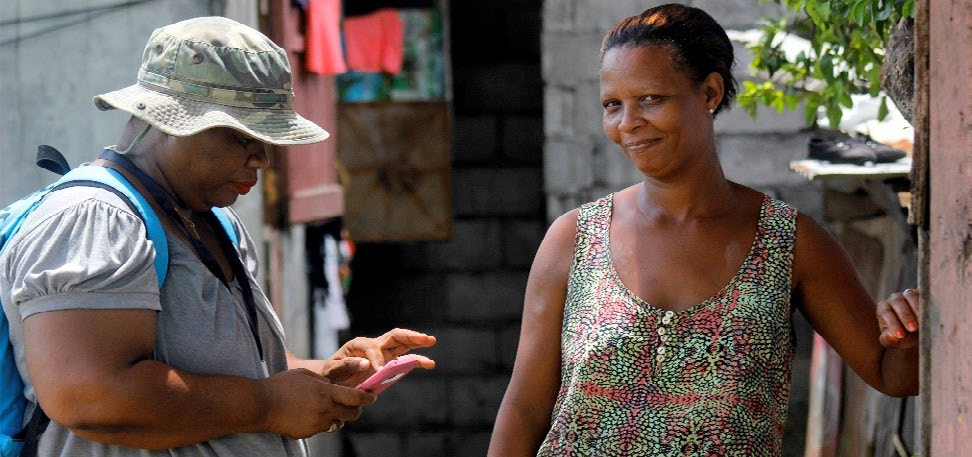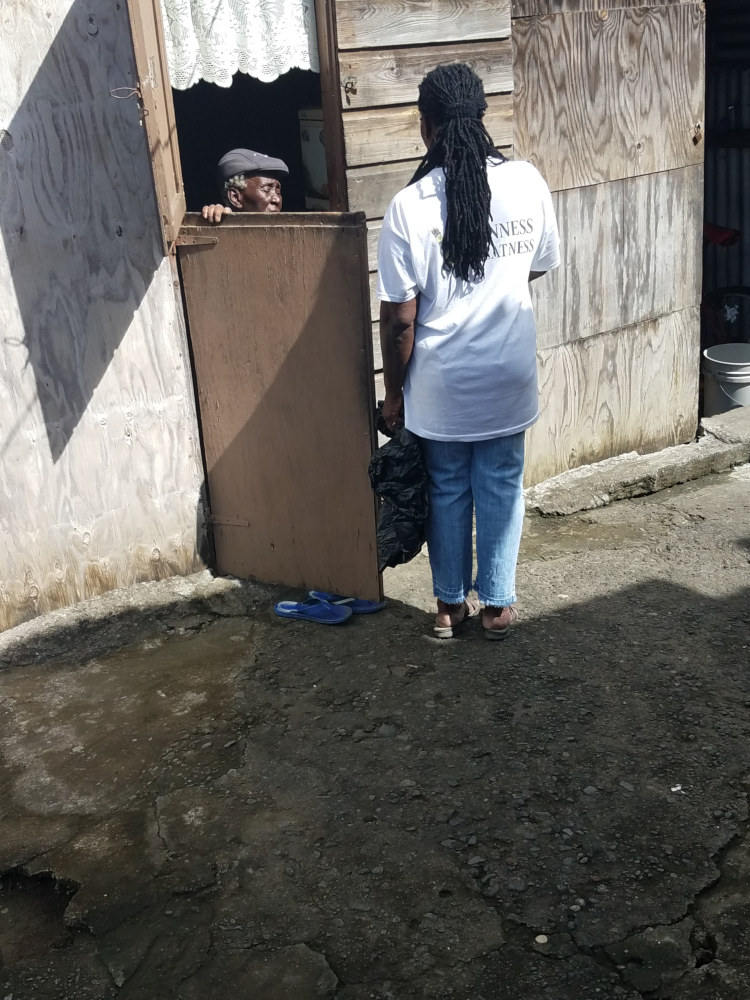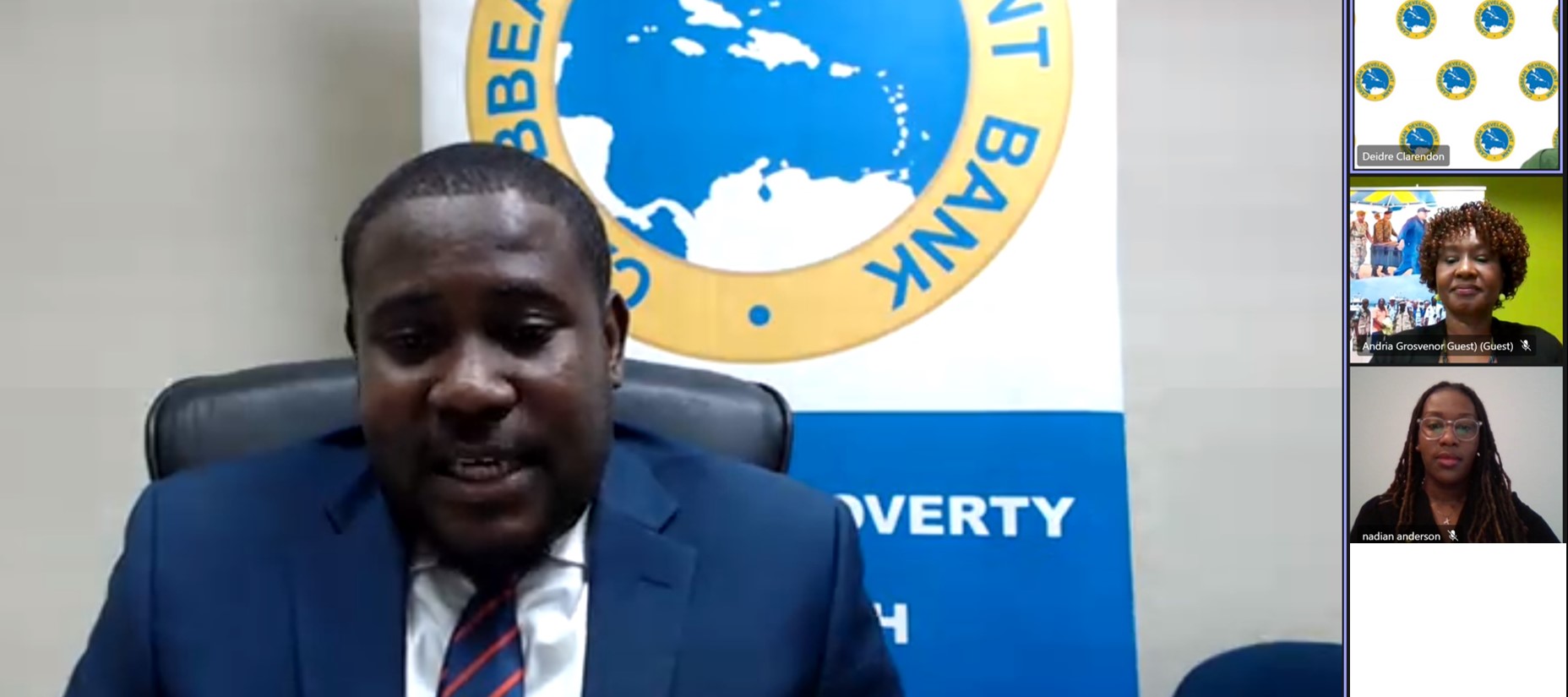Beyond the technology
How the Caribbean Development Bank is using KoboToolbox to enhance community resilience in the Caribbean
Latin America and the Caribbean are two of the most disaster-prone regions in the world. In the last two decades, over 152 million people have been displaced and horribly affected by 1,205 disasters, with earthquakes and hurricanes being the most common. As climate change causes increasingly severe hurricane seasons and greater devastation, disaster management and response preparedness are more essential than ever.

In these emergency situations where access to real-time data is critical, KoboToolbox makes a difference. The Caribbean Development Bank (CDB) is one of many organizations using KoboToolbox to improve response capacity in disaster scenarios.
Recently, we spoke with Richardo Aiken, Community Development Specialist at CDB, about his work to enhance community resilience and how KoboToolbox is helping establish better baseline data to improve disaster response.
Aiken’s efforts seek to strengthen disaster risk management and climate change adaptation risk preparedness within vulnerable communities across the Borrowing Member Countries (BMCs). Given their membership with CDB, these BMCs can borrow funds from the bank to finance social and economic programs.
Learn more about Richardo’s innovative work below (Note: The following conversation has been edited for length and clarity).

What is CDB doing to strengthen disaster risk management, risk preparedness, and climate change adaptation capacity across communities? How does this relate to data collection?
Richardo Aiken: The CDB manages the Community Disaster Risk Reduction Fund (CDRRF), a multi-donor trust fund focused on community-based disaster risk reduction across four countries: Jamaica, Belize, British Virgin Islands, and Saint Vincent and the Grenadines.
With contributions from the Government of Canada, the European Union and the CDB, this fund supports projects that reduce the impacts of natural hazards and support climate change adaptation. By engaging in infrastructure improvements, vulnerability assessments, and training initiatives, the fund supports local farmers, fisherfolk, small business owners and employees, youth, and the elderly in these communities.
Given this community-driven approach, data collection is seen as critical by the CDB and our partners to gather timely information on different community issues to inform our planning interventions. We are especially focused on how to improve community participation in these initiatives.
How would you describe CDB’s work in Latin America and the Caribbean?
RA: At CDB, we are driving an innovation model that prioritizes efficiency to improve our service offerings and optimizes the thought leadership that we provide to our BMCs. Ultimately, this focus has driven our need for data.
Dr. Gene Leon, President of the CDB, continues to articulate the perspective that in order to adequately understand and respond to the developmental challenges of our Region, we need to target better in order to measure better. Access to current and accurate data on our BMCs remains a critical step in achieving the Sustainable Development Goals.
When planning for any situation, not just for an emergency, we know that we need access to reliable data. Whether initiating poverty reduction efforts, planning environmental interventions, or preparing climate change adaptations - all of these initiatives require data.
The global pandemic showed how critical it is to have accurate, reliable data and a platform that enables organizations to better respond during, or post, emergencies like this one.
What did your initial data collection efforts and methods look like?
RA: To improve our disaster risk management, we needed to capture pre-disaster event data on the main livelihood activities in a community. To gather this information, we collaborated with the FAO to develop Livelihood Baseline Assessments (LBAs) for 26 communities.
Initially, we used paper-based surveys to gather information about communities. However, as we were developing the LBAs, we had to find a quicker way to collect data.
When an emergency strikes, one of the main issues is that we wouldn’t know what was lost, without having data from these baseline data assessments. This presents a major challenge in determining the value of what previously existed, making it difficult for humanitarian aid organizations and governments, as well as development agencies like the CDB to estimate the appropriate relief support needed.
In a post-disaster scenario, this information is critical since it acts as a baseline to assess what was lost and what the community looked like before. This comparison enables the CDB to develop a more reliable estimate of the support needed and the value of what was destroyed. The tool also helps to inform the Damage and Loss Assessment Reports and Post Disaster Needs Assessment, which are critical for post-disaster planning and resource mobilization and allocation.
As we worked to collect LBA data, we had merely a few days in each country to spend on data collection. Back then, our paper-based approach was taking up to two weeks to fully collect and analyze all our findings. We also wanted to be able to easily share our findings with the communities themselves. This led us to discovering KoboToolbox.
How did you first get involved with KoboToolbox?
RA: We were first introduced to KoboToolbox through Dr. Donovan Campbell, the Head of the Department of Geography and Geology at the University of the West Indies, Mona.
At this point in time, we were looking for a quicker, more efficient mode of data collection and analysis. Once we learned more about the platform’s capabilities and novelty features, such as GPS mapping and pictures, and realized how this addressed our needs, we started using KoboToolbox as our primary data collection tool. Beyond this, we also use it in our work to provide community-based data and to inform our planning.
Can you tell us more about your experiences using KoboToolbox?
RA: Our adoption of the KoboToolbox platform in our data collection and data management is aligned with our innovation and knowledge management policy framework. We believe it can lead to even greater opportunities for us in terms of how we do business, as well as provide insight to other innovative platforms that can be used.
We are also happy to report that we have received a great deal of positive feedback from our data collectors who report they enjoy using this tool.
As the majority of CDRRF sub-projects are conducted in rural communities, we especially value KoboToolbox’s online portal and offline capabilities. For example, when using this tool in the remote areas of Belize, it has been extremely useful to be able to collect information via cell phones and tablets and then upload the data once we regain access to wifi.
The speed and ease of data collection and analysis has been significantly enhanced, especially when compared to our previous methods.
Since starting to use KoboToolbox, CDB has hosted several training sessions. How did these sessions get started?
RA: Once we decided to use KoboToolbox, we knew we wanted to ensure that all the relevant persons had the skills to use the platform. We had our first training session with over 50 of our stakeholders in December 2019 and then our second one in 2020. Our third and most recent training session was hosted on June 9, 2021, in collaboration with Caribbean Disaster Emergency Management Agency (CDEMA) and was attended by over 200 humanitarian aid workers and frontline disaster responders.

Given the increasingly active hurricane seasons and worsening natural disasters, was this a factor when organizing the latest training session?
RA: In CDB’s discussions with CDEMA, we knew it would be critical to time the workshop so that it fell prior to hurricane season.
In the event that the region experienced another emergency, we wanted to make sure that more persons performing the post-disaster assessment were trained in and aware of the KoboToolbox platform.
When this is not the case, disaster management and response can be significantly hindered, such as in St. Vincent’s post-eruption scenario earlier this year [2021]. There were only a limited number of persons with the skills to use KoboToolbox, resulting in a restricted capacity to perform the necessary damage assessments.
Enhancing this capacity is an important skill set to develop within our respective countries to enable quicker assessment and response to these types of emergencies.
What has been the impact of all this data collection work so far?
RA: Under the CDRRF, we developed community profiles and Livelihood Baseline Assessments (LBAs) for the first time. These efforts cover the eleven beneficiary communities in St. Vincent and four of the five communities in Jamaica.
Today, these documents are readily available to inform planning at the local level. Since the completion of this documentation, numerous partners from across the region and beyond have reached out to us, requesting access to this information to help inform their work in these spaces.
We plan to take on similar interventions in Belize and are in the process of capturing data across the eleven communities in the Toledo area. Ultimately, we hope to replicate this data-driven model across the other BMCs.
What is a lesson you’ve learned from collecting community-based data?
RA: From gathering information at the community level, we have noticed that the absence of community-based data can provide serious challenges for communities themselves.
For instance, they may have difficulty clearly articulating their needs in a manner that is representative of the community. Let’s say there is an issue with a community’s water supply. Without data on the number of persons impacted – males and females - or the health risks resulting from limited access to potable water, it can be challenging for local community groups to effectively advocate for change.
Lacking these critical data points presents a huge issue when preparing funding proposals for preventative relief efforts, as it is essential to clearly state the issue and provide data on how this is impacting the community.
Beyond collecting data in disaster scenarios, can you expand on how CDB is using KoboToolbox?
RA: As a bank, we are focused on making our region more resilient. Having readily available information allows us to respond faster, while innovative data collection platforms can help us to understand our risks and respond to these within the shortest possible time because of how quickly data collection and analysis can take place.
The baseline data collected by LBAs are not only valuable in post-disaster settings, but also in pre-disaster scenarios since the information can highlight existing vulnerabilities. For instance, it may show that a community is at risk of land slippages. With the mapping feature and GPS capabilities of the KoboToolbox platform, the most likely flood zones can be identified. Armed with this knowledge, the community can address these risks before floods occur.
Using this readily available data, communities can now identify areas that are most at risk, submit proposals for aid, and make more informed decisions to better their quality of life. With access to data and information, communities are empowered to become better partners in building resilience, rather than relying solely on governments or international partners to recognize their needs.
With this data-driven approach, communities can advocate for themselves, articulate challenges faced, and seek funding for interventions.
Looking ahead, how do you see enhanced data collection impacting the region?
RA: Our organization hopes to build a culture of data, not just at the CDB level, but within the region’s countries, ministries, departments, agencies, and all the way to the communities at the grassroot level. Currently, we are examining how online data collection can improve other projects and programs across the organization, as is CDEMA.
Reliable data is not only critical in a post-disaster scenario, it provides us the tools to consider how we can be more proactive in our response. If there is an emergency or natural disaster, we can estimate what was lost and understand how to build back better using the data and information provided by the KoboToolbox platform.
Besides the applications in pre and post-disaster scenarios, KoboToolbox provides access to readily available data and information, further broadening the possible use cases. For instance, CDB conducts Country Poverty Assessments, which evaluate program effectiveness and guide intervention development.
Together, CDB and CDEMA seek opportunities to provide ongoing support to further resilience building within communities.
To learn more about the Caribbean Development Bank and their programs, visit their website at https://www.caribank.org/.